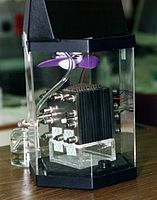
Photo from wikipedia
Owing to the low price, chemical stability and good conductivity, carbon-based materials have been extensively applied as the anode in microbial fuel cells (MFCs). In this review, apart from the… Click to show full abstract
Owing to the low price, chemical stability and good conductivity, carbon-based materials have been extensively applied as the anode in microbial fuel cells (MFCs). In this review, apart from the charge storage mechanism and anode requirements, the major work focuses on five categories of carbon-based anode materials (traditional carbon, porous carbon, nano-carbon, metal/carbon composite and polymer/carbon composite). The relationship is demonstrated in depth between the physicochemical properties of the anode surface/interface/bulk (porosity, surface area, hydrophilicity, partical size, charge, roughness, etc.) and the bioelectrochemical performances (electron transfer, electrolyte diffusion, capacitance, toxicity, start-up time, current, power density, voltage, etc.). An outlook for future work is also proposed.
Journal Title: ChemPlusChem
Year Published: 2021
Link to full text (if available)
Share on Social Media: Sign Up to like & get
recommendations!